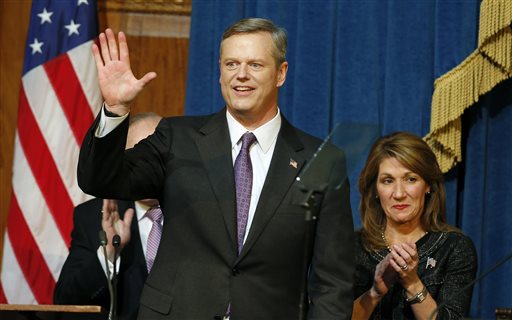BOB SALSBERG, Associated Press
BOSTON (AP) — While partisan battles rage in Washington and state capitals, Republican Gov. Charlie Baker thrives in one of the nation’s bluest states.
He trades compliments, not jabs, with Democratic legislative leaders and has forged close relationships with other key Democrats, including Boston Mayor Marty Walsh. Democrats, in fact, occupy several key posts in his cabinet and inner circle.
“As the administration ends its first year in office, some have lamented how boring we are,” Baker said in his recent state of the state address. “I’ll admit: That makes me smile. No fights. No yelling. No partisan scrums.”
For the most part, Baker has sought compromise over confrontation since narrowly defeating Democrat Martha Coakley in the 2014 gubernatorial election. Four years earlier, in a losing campaign against then-Gov. Deval Patrick, a Democrat, Baker came off as angry and partisan, even he acknowledges.
A pet term Baker now uses to describe budgets and other major bills is “combo platters.” It’s his way of suggesting that laws can be crafted to satisfy a range of political and policy tastes.
“A lot of Republicans look at government as the enemy,” said Will Keyser, a top strategist in Baker’s 2014 campaign. “Gov. Baker looks at government as a really important function, a limited function in very special areas, but a very important function.”
So far, the bipartisan approach has clicked in a state with a highly partisan reputation. Socially liberal but fiscally conservative, Baker has seen his favorability ratings soar. One national poll last fall declared him the most popular governor in America.
Another survey of 500 registered voters conducted in November by the MassINC Polling Group found that 51 percent of rank-and-file Massachusetts Democrats held a favorable opinion of the Republican, with only 13 percent unfavorable. Baker’s appeal is even stronger with independents. Seventy percent of registered voters not enrolled in either major party viewed Baker favorably, a mere 9 percent unfavorably.
Still, few expect the harmony to last forever.
Many liberal legislators have shown signs of chafing at Baker’s rigid no-new-taxes mantra, saying the state needs additional revenue to address crumbling infrastructure and other longstanding problems. Local educators are disappointed with Baker for pushing expansion of independent charter schools while proposing only marginal increases in state funding for traditional public schools.
Democrats recently chided Baker for his eleventh-hour endorsement of Chris Christie in the neighboring New Hampshire presidential primary. Christie finished sixth and abandoned the race.
The state Democratic Party said Baker’s “tepid, last minute support” not only failed to lift Christie but may have contributed to Donald Trump’s success in New Hampshire.
Baker has blasted Trump for lacking “the temperament or seriousness of purpose” to be president. In backing Christie, Baker noted the New Jersey governor was also a Republican in a heavily Democratic state, working with people he didn’t always agree with.
The Harvard-educated Baker learned the do’s and don’ts of Massachusetts politics in the 1990s while serving in the cabinets of Republican governors William Weld and the late Paul Cellucci. Both scored policy wins in part by assimilating with, rather than bitterly contesting, Democrats who held veto-proof majorities in both legislative branches.
Republican governors also benefit from a skittishness many voters have about big government spending.
Residents recall how the state was derisively called “Taxachusetts” for having once been among the highest-taxed and least business-friendly of states. They also recall how cost overruns and mismanagement turned Big Dig — the complex and costly project to bury Boston highways — into a poster child for bloated public works projects.
“That is where Charlie Baker fits into the mainstream of Massachusetts political thought,” said Michael Goldman, a longtime Democratic political consultant. “You can be a fiscal conservative and get elected.”
On social issues, however, Baker remains firmly within the Massachusetts mainstream in his support for abortion rights and same-sex marriage.
Embracing his reputation as a “fix-it” governor, Baker has eagerly charted corrective courses for problem areas in government, including the state’s overburdened child welfare agency and, most notably, the Massachusetts Bay Transportation Authority, the Boston-area’s aging and deficit-ridden transit system that was crippled by record winter storms a year ago.
Baker’s political fortunes could turn all too quickly, said Goldman, if the economy sours or services now under his watch, like the MBTA, fail again.
“You can go 364 days and everything works well and then one day the whole thing crashes and burns,” said Goldman.
Keyser, now a private consultant, agrees Baker’s initial successes provide no long-term guarantees in Massachusetts.
“This is a blue state,” said Keyser. “At some point there may be some tough sledding.”


